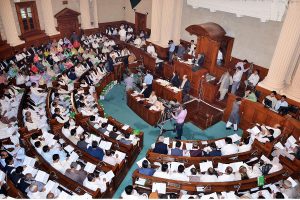The order issued by the governor may be challenged by the PA speaker as being unlawful.
According to a senior law official, Sibtain is disobeying the Constitution by proceeding with the action.

ISLAMABAD:
The Punjab Assembly Speaker Muhammad Sibtain Khan is being questioned about whether or not the governor’s directive to take a vote of confidence for PML-Q stalwart and Chief Minister Parvez Elahi is unconstitutional.
According to a top legal official who spoke to The Express Tribune, the PA speaker’s declaration that the governor’s request was unconstitutional violated the Constitution.
The fate of the decision, he said, would be similar to that of Qasim Suri, the deputy speaker of the National Assembly at the time, who had his decision declared unconstitutional by the supreme court.
The attorney, however, argued that the PA speaker should first address the matter that was brought to his attention by his secretariat: the opposition’s proposal to hold a vote of no confidence in the chief minister.
Senior attorneys have advised the Punjab Assembly’s opposition to appeal the speaker’s decision in the higher courts.
Although cases might be brought before the Lahore High Court, Dost Mazari, a former deputy speaker of the PA, had his decision appealed to the Supreme Court, which found it to be unconstitutional.
Unable to understand how the PA speaker could declare the governor’s order unlawful, a senior PTI lawyer voiced his surprise.
He emphasised that the opposition has a solid chance to appeal the judgement in court because of the last paragraph of the decision.
One faction of the PTI questions whether it was an intentional action by a province minister who has a soft spot for CM Elahi, and they seek to postpone the assembly’s dissolution against the intentions of party leader Imran Khan.
Legal expert and PTI Senator Ali Zafar claimed that the Constitution established a deadline for completing the procedure for holding a vote of no-confidence against the chief minister.
On the other hand, he pointed out that there was no deadline in the Constitution for holding a vote of confidence for the CM in accordance with the governor’s instructions.
In my view, the vote of no confidence resolution tabled by the opposition in the provincial assembly should be discussed first by the PA speaker, Zafar continued.
He chose not to address the last paragraph of the judgement, which ruled that the governor’s decree was illegal.
A other prominent lawyer asserted that political, as opposed to legal, measures could be taken to prevent the dissolution of the Punjab Assembly.
In the current instance, the governor and the opposition Punjab Assembly members simultaneously cited Articles 130(7) and 136 of the Constitution against the chief minister, according to senior attorney Hafiz Ahsaan Ahmad Khokhar.
A provincial legislature shall, unless sooner dissolved, continue for a term of five years from the day of its first sitting, he continued, in accordance with Article 107 of the Constitution.
Additionally, it shall be disbanded at the end of its term. “Under Article 112 (1) of the Constitution, the governor is obligated and has no other legal option except to dissolve the provincial parliament at the chief’s recommendation.
he noted, “Minister.
Khokhar stated, “The provincial legislature must stand dissolved at the expiration of 48 hours after the chief minister has so advised, unless earlier dissolved.”
According to Article 130(7) of the Constitution, the chief minister shall serve at the leisure of the governor, according to the senior attorney.
He did, however, add that the governor must be convinced that the chief minister does not have the support of the majority of the provincial assembly members before acting on his authority under this section.
In such a scenario, the governor would convene the provincial parliament and order the chief minister to get a legislative vote of confidence.
The governor was competent and may choose a date with a reasonable amount of time for this purpose, according to Khokhar, even if there was no time limit imposed by Article 130(7) of the Constitution on the chief minister to obtain a vote of confidence.
“Upon receiving these instructions, the PA speaker is unable to adjourn the proceedings at his discretion. The issue raised by the governor in accordance with Article 130(7) of the Constitution should be carried out in a very reasonable amount of time, he added.
He added that under Article 136 (1) of the Constitution, a motion for a vote of no-confidence against the chief minister could be approved by at least 20% of the members of the provincial legislature.
The resolution mentioned in clause (1) of Article 136 of the Constitution, he continued, shall not be put to a vote before three days have passed or after seven days have passed from the day it was moved in the provincial legislature.
“The chief minister shall vacate his or her position if the resolution referred to in clause (l) of section 136 of the Constitution is approved by a majority of the members of the provincial legislature. The senior lawyer clarified that the governor might request the chief minister to remain the position until his successor took over under Article 133 of the Constitution.
In light of the situation that has existed since April and the speaker’s decision on any issue, according to Khokhar, the current case will ultimately be heard by a superior court. This is true for both the procedure for the vote of confidence that the governor is required to follow under Article 130(7) of the Constitution in order to hold the session that he has set, as well as the procedure for the vote of no-confidence that the opposition is required to follow under Article 13(6) of the Constitution.
According to PML-N attorneys, Elahi would lose his position as chief minister if the governor ordered the chief minister to take a vote of confidence on Wednesday (today).
They also said that, given the political climate, the governor may issue any order.










































